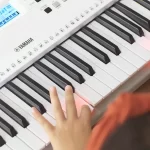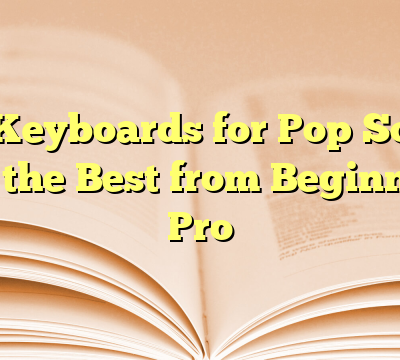Starting to learn the keyboard can be both exciting and a bit daunting. But what better way to dive in than with some fun and easy songs? They're not just enjoyable to play; they're also great for boosting confidence and building foundational skills.
From timeless classics to modern pop hits, there's a wide range of tunes that are perfect for beginners. These songs often feature simple melodies and chords that can be picked up quickly, making practice sessions something to look forward to.
Benefits of Learning Keyboard with Fun Songs
When beginners choose fun songs as their entry point into the world of keyboard playing, they're not just making practice enjoyable. They're setting themselves up for a more effective learning experience. Here's why incorporating fun songs into keyboard practice is a brilliant move for any novice player.
First and foremost, engagement levels soar when learners tackle songs they actually enjoy. It's no secret that motivation can wane if practice feels like a chore. However, when beginners are excited about the tunes they're learning, they're more likely to sit down at the keyboard regularly and for longer periods. This consistent practice is key to making progress.
Moreover, fun songs often come with the advantage of simplicity. Many beginners' favorites have straightforward melodies and chords, making them accessible for someone just starting out. This simplicity is not a drawback but an incredible asset. It allows learners to focus on the fundamentals of music theory and technique without getting overwhelmed.
Here’s a brief look at how fun, easy songs can impact learning:
| Aspect | Impact |
|---|---|
| Engagement | High engagement leads to consistent and longer practice sessions. |
| Musicality | Simple songs help in understanding basic music theory concepts. |
| Technique | Players develop fundamental playing techniques more naturally. |
| Confidence | Early successes boost learners’ confidence in their ability. |
Furthermore, learning through songs that are both enjoyable and widely recognized provides an invaluable opportunity for beginners to share their progress. Whether it's a family gathering or a school talent show, being able to perform a popular tune boosts their confidence exponentially. This public or even informal family performance experience is crucial as it introduces a sense of purpose and achievement in their musical journey.
Another key benefit revolves around the development of musical ear and creativity. As learners play songs they love, they're more likely to experiment with them - perhaps changing the tempo, trying out different octaves, or adding a personal touch to the melody. This experimentation is a fantastic way for beginners to develop a deeper understanding of music as a creative expression, not just a skill set to master.
Lastly, the flexibility of song choices in keyboard learning allows for a personalized learning path. Everyone has different taste in music, and when learners can pick songs that resonate with them personally, it adds a layer of personal connection and dedication to the learning process.
Timeless Classics for Beginners

When embarking on the journey of learning to play the keyboard, beginners often find themselves sifting through countless songbooks and online resources, searching for that perfect set of tracks to start honing their skills. Amidst a vast sea of options, there lies a treasure trove of timeless classics that not only resonate with audiences of all ages but also offer the perfect blend of simplicity and enchantment to kickstart a beginner's musical journey.
"Twinkle Twinkle Little Star", arguably the epitome of classic melodies, serves as an excellent starting point. Its straightforward rhythm and repetitive melody line make it an ideal choice for mastering basic finger movements and understanding musical notation. Similarly, "Jingle Bells" offers a jovial tune that's as enjoyable to play as it is recognizable, teaching beginners about tempo and dynamic expression with its upbeat and merry rhythm.
On the other hand, classics like "Ode to Joy" by Beethoven introduce beginners to the world of classical music with a simple yet profound melody. Playing such a piece not only instills a sense of accomplishment but also nurtures an appreciation for classical compositions. Furthermore, the flexibility in tempo and dynamics in this piece makes it a versatile choice for learners at different stages of their keyboard journey.
In addition to these, "Fur Elise", another masterpiece from Beethoven, can be adapted for beginners. Although the original composition is complex, simplified versions allow beginners to experience the beauty of classical music while gradually improving their skill set. This piece particularly emphasizes the importance of emotion and expression in music, encouraging students to explore the expressive potential of the keyboard.
Each of these classics carries a unique charm and learning opportunity, making them indispensable tools in a beginner's repertoire. They not only foster a deep connection with music from the get-go but also pave the way for exploring more intricate compositions in the future.
| Song | Composer | Key Skills Developed |
|---|---|---|
| Twinkle Twinkle Little Star | Trad. | Finger movements, notation |
| Jingle Bells | James Lord Pierpont | Tempo, dynamic expression |
| Ode to Joy | Ludwig van Beethoven | Appreciation for classical music |
| Fur Elise | Ludwig van Beethoven | Emotion, expression |
Modern Pop Hits to Master

While timeless classics offer a solid foundation for beginners, diving into modern pop hits can be equally rewarding and entertaining. These contemporary songs not only keep practice sessions fresh and engaging but also allow learners to play tunes they hear on the radio or their streaming playlists. Let's explore a few pop hits that have straightforward chord progressions and melodies, making them perfect for keyboard beginners.
One standout song that combines simplicity with popularity is "Someone Like You" by Adele. Its repetitive chord pattern and soulful melody make it an excellent choice for beginners eager to perform a song that resonates with many. Another hit that's fun to learn is "Love Yourself" by Justin Bieber. The song’s uncomplicated structure and catchy melody offer a great way to practice rhythm and chord transitions without feeling overwhelmed.
For those who enjoy a bit of a challenge while still sticking to the beginner-friendly theme, "Clocks" by Coldplay provides a rhythmic pattern that's mesmerizing yet not too difficult to master with some practice. This song introduces syncopation and arpeggios in a way that's accessible for novices.
Here's a brief overview of these modern pop hits along with their key characteristics:
| Song Title | Artist | Key Features |
|---|---|---|
| Someone Like You | Adele | Repetitive chord pattern, Soulful melody |
| Love Yourself | Justin Bieber | Simple structure, Catchy melody |
| Clocks | Coldplay | Rhythmic pattern, Introduction to arpeggios |
Encouraging learners to explore songs outside the classical repertoire enhances their musical experience. It allows them to connect with the music they love and share their progress with friends and family through performances of familiar tunes. Additionally, tackling these pop hits can boost confidence and motivate beginners to continue their keyboard journey.
Beyond the fun aspect, learning modern songs helps in understanding contemporary music theory and composition techniques. It exposes players to various genres and styles, fostering a versatile skill set that's beneficial for future musical endeavors.
As beginners progress through their journey, gradually increasing the complexity of the songs they learn is crucial. Starting with these pop hits and moving towards more intricate compositions ensures a balanced and comprehensive learning experience. Every new song brings its own set of challenges and learning opportunities, reinforcing key concepts and skills developed through practice.
Tips for Practicing Keyboard Songs

Starting out on the keyboard can be an exciting journey, and choosing fun songs is crucial to keeping that excitement alive. However, knowing how to practice effectively is just as important to make progress. Here are some tips that beginners can follow to enhance their practice sessions.
Create a Routine
Establishing a consistent practice routine can work wonders. It's not just about the quantity of practice but the quality and regularity. Beginners should aim for short, daily practice sessions instead of long, infrequent ones. Starting with as little as 15 to 20 minutes a day can lead to significant progress. The key is consistency.
Break It Down
Trying to tackle an entire song in one go can be overwhelming. Instead, break the song into smaller, manageable sections. Focus on mastering a single chord progression or melody line before moving on to the next. This method not only makes learning easier but also boosts the sense of achievement as each part is mastered.
Slow and Steady
Speed is not a friend when learning a new song on the keyboard. Beginners should start playing the notes slowly to ensure accuracy and to internalize the melody and rhythm. As the movements become more familiar, gradually increase the tempo. Using a metronome can help maintain a steady pace and improve timing.
Use Technology
In this digital age, numerous resources can aid in learning keyboard songs. Apps and online tutorials offer visual and auditory guidance that can be extremely helpful. Recording practice sessions and playing them back can also provide insight into areas that need improvement.
Focus on Hand Position and Posture
Good hand positioning and maintaining a proper posture are crucial for playing effectively and avoiding strain. Beginners should pay close attention to their hand placement on the keyboard and ensure their back is straight and shoulders are relaxed. Proper technique lays the foundation for more advanced playing in the future.
Set Realistic Goals
Setting achievable goals can keep motivation high and provide a clear path forward. Whether it's mastering a particular song by the end of the month or learning a new chord each week, goals should be specific, measurable, and attainable. Celebrating these small victories can fuel the desire to keep learning.
Conclusion
Diving into the world of keyboard playing opens up a universe of musical possibilities. By embracing modern pop hits as part of their learning journey beginners will find themselves not only enjoying the process but also rapidly improving their skills. Remember it's all about the journey. With a little patience and dedication to the practice tips outlined they'll soon be playing their favorite tunes with ease. So grab that keyboard and let the music begin!
Harlan Kilstein began playing piano during covid with no piano background at all. He taught himself how to play learning what to do and what not to do.
Today he's an advanced intermediate player and can help you grow in your skills because he learned all this on his own.








